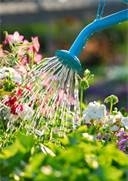October 17, 2014
 Having a garden can be a fun and rewarding experience, but what do you do when an especially harsh winter comes along? Some people think that you should just let your garden die out and start fresh in the spring, but others like to keep their gardens alive during the winter. Some gardeners even like to keep a winter garden, no small feat considering how cold winter can get. Whether you want to keep growing vegetables throughout the winter or you just want to protect your dormant garden until the spring, here are a few tips that should come in handy.
Having a garden can be a fun and rewarding experience, but what do you do when an especially harsh winter comes along? Some people think that you should just let your garden die out and start fresh in the spring, but others like to keep their gardens alive during the winter. Some gardeners even like to keep a winter garden, no small feat considering how cold winter can get. Whether you want to keep growing vegetables throughout the winter or you just want to protect your dormant garden until the spring, here are a few tips that should come in handy.
1. Make Sure to Grow the Right Plants
Not many plants will grow in the dead of winter, but depending on where you live and how cold it gets, there are still some plants that might thrive. Spinach, kale, cabbage, lettuce and other leafy vegetables generally do well in the winter along with garlic, mustard, broccoli and turnips. These vegetables should all be planted early in the fall and be protected, as they probably won’t survive temperatures less than 20 degrees Fahrenheit.
2. Add a Layer of Mulch
When it comes to protecting your plants from the cold, simply adding an extra layer of mulch can go a long way. It often isn’t cold that damages plants in the winter but the “heaving” effect that soil has on root systems as it freezes and thaws. Mulch can act as an insulator and keep heat and moisture in the soil. A 2-3 inch thick layer of wheat or pine straw will work best for most gardens, but be careful if you have roses or strawberries. It is possible to “overwinter” these plants if you cover them with too much mulch.
3. Keep Your Plants Covered
You can help protect some of your more delicate plants by covering them with a tarp, a blanket or a large piece of agricultural cloth. It’s not a foolproof method of keeping your vegetables alive, but every little bit of protection helps.
4. Build a Cold Frame
A cold frame works much like a greenhouse in that it traps heat close to the plants and keeps out cold. It can be made from PVC pipe or slender metal rods bent into the correct shape. It is then covered with plastic sheeting. It’s easily the best solution for keeping your plants warm in the winter, but it does require a bit of work. Many people also think it looks unattractive. If appearance is a major issue with you, you might want to go with another solution. Otherwise, a cold frame is ideal if you want your garden to survive the winter.
5. Keep Your Plants Watered
You should always keep your plants no matter what time of the year it is, but it is especially important to do so in the winter. Moist soil traps heat much more easily than dry soil, and the water that evaporates will warm the air around the plants. This isn’t recommended if you are expecting a hard freeze since it could make things worse, and it shouldn’t be done with soil that is already frozen, but it works surprisingly well if the temperature hasn’t dropped too low yet.
Gallery
“We recommend Twin Oaks to any entity looking for a full-service, talented, and responsive provider.”
